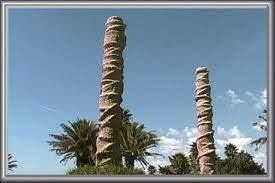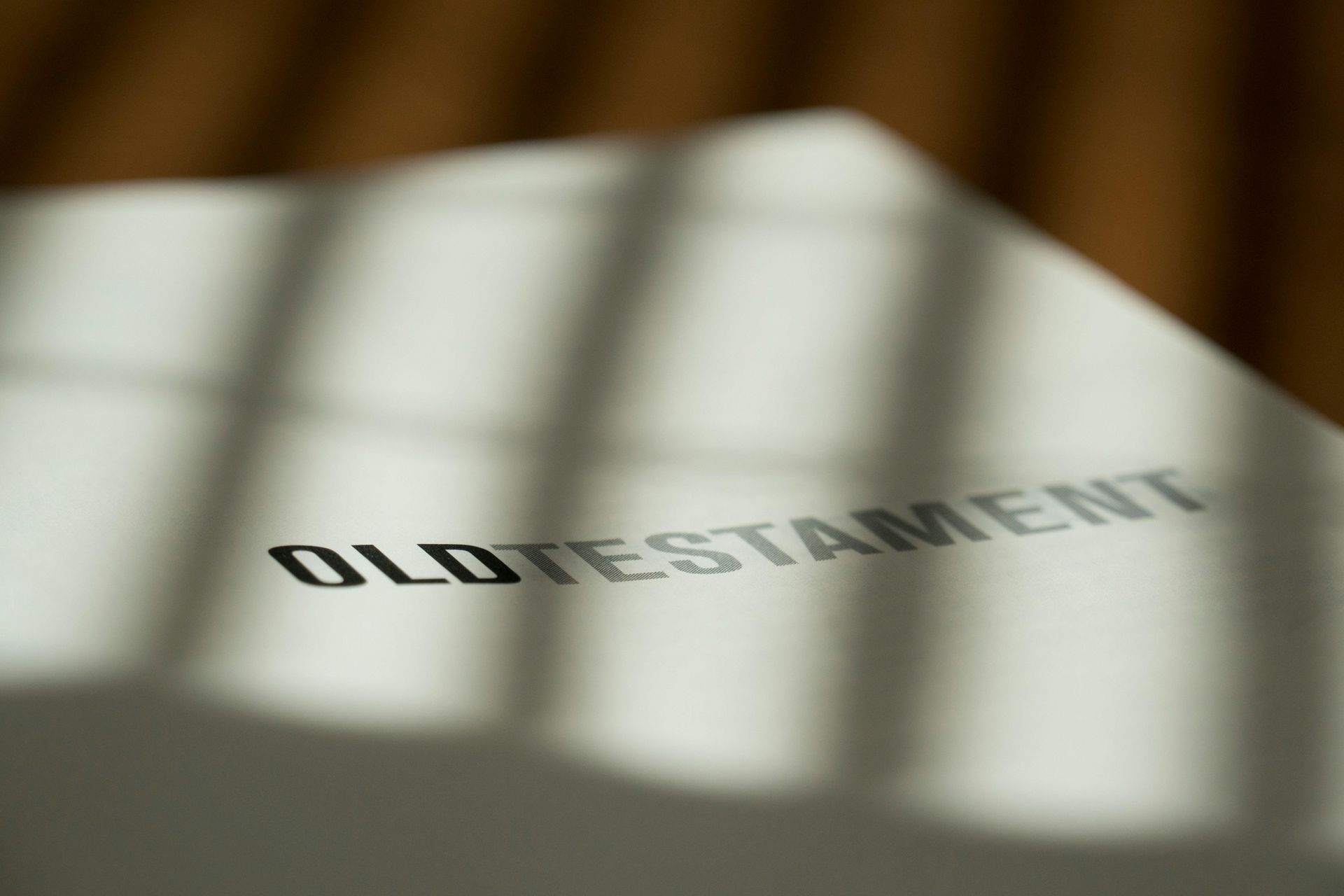Get in touch
555-555-5555
mymail@mailservice.com
Exodus 34
Exodus 34: Another trip up the Mountain
Exodus 34:1 “The Lord said to Moses, ‘Chisel out two stone tablets like the first one, and I will write on them the words that were on the first tablets, which you broke.’”
Moses may have thought, “How’d He know that I broke those tablets?”
God said, “which YOU broke.” Imagine the look on God’s face (if you could see it).

b, “Be ready in the morning, and then come up on Mount Sinai.”
Did Moses mutter to himself, like our kids might have, “In the morning? That’s awfully short notice. I had plans for tonight. It would have been nice if he had asked me if this fits my schedule. Why couldn’t He provide me with the tablets once I got up there. Doesn’t he realize how old I am?”
In Exodus 34:4, our hero Moses came through. “So, Moses chiseled out two stone tablets (willingly, cheerfully and as instructed) and went up Mount Sinai early in the morning (with a good attitude). Carrying the stone tablets in his hands.”
Ah ha, it looks like we might have a clue as to how big these stone tablets were. He didn’t carry them on his back, or in his arms, but in his hands. They might have been no bigger than our smartphones.
Moses heads back up the mountain and meets with God, again. God says, of Himself, Exodus 34:6, “The Lord, the Lord, the compassionate and gracious God, slow to anger, abounding in love and faithfulness, maintaining love to thousands, and forgiving wickedness, rebellion, and sin. Yet he does not leave the guilty unpunished; he punishes the children and their children for the sins of the fathers to the third and fourth generation.”
This last part sounds as if He punishes the children, not for what they did wrong, but for the sins of the parents. Is this justice? Is God contradicting Himself when in Ezek. 18:20 it says, “The one who sins is the one who will die. The child will not share the guilt of the parent, nor will the parent share the guilt of the child. The righteousness of the righteous will be credited to them, and the wickedness of the wicked will be charged against them.”?
There are no generational curses, where God punishes descendants for what their ancestors do. But a new generation tends to repeat the sins of their parents. How we live will, to a certain extent, determine how our children and grandchildren live. The religion we practice, the foods we eat, our child-rearing practices are usually learned from our parents, and we carry them on from one generation to the next. If what we are doing is wrong, we can expect a bad outcome. God “punishing the children” is simply another way of saying that the children are repeating the fathers’ sins.
At this point, Moses is very impressed, he bows down and says, in Exodus 34:9, “O Lord, if I have found favor in your eyes, then let the Lord go with us.” This seems like a good time to ask God to go with them. He had just told Moses how loving and forgiving He is.
Exodus 34:10 is a renewing of the covenant with Israel. “I am making a covenant with you before your people. I will do wonders never before done in any nation in all the world. The people you live among will see how awesome is the work that I, the Lord, will do for you.” Translation: “You haven’t seen anything yet. All those miracles as we left Egypt was but a warmup act to what you will see in the days to come.”
Pointing to the future God goes on to say, Exodus 34:11, “I will drive out before you the Amorites, Canaanites, Hittites, Perizzites, Hivites and Jebusites. Be careful not to make a treaty with those who live in the land where you are going, or they will be s snare among you.” We’ve heard this before, haven’t we? “I will drive them out” and “Don’t make a treaty with them.”
He goes on to say that the Israelites are to destroy all of their pagan religious symbols. Verse 13, “Break down their altars, smash their sacred stones and cut down their Asherah poles.”
When an army invades another country, soldiers sometimes bring back home war souvenirs. The Israelites weren’t to keep any of the religious objects. They were to destroy them. One item in particular was the Asherah pole. What is an Asherah pole? Scholars think that the poles were made of wood because in Judges 6:25 Gideon cut one down and used it for a burnt offering.
Deuteronomy 16:21 says, “Do not set up any wooden Asherah pole beside the altar you build to the Lord your God."

Here is what an Asherah pole may have looked like.

They remind me of the Totem poles carved by native Americans. But the totem pole was not a religious symbol. Rather, they represented or commemorated the history of the family or tribe.
Verse 15, “Be careful not to make a treaty with those who live in the land; for when they prostitute themselves to their gods and sacrifice to them, they will invite you and you will eat their sacrifices.”
In Leviticus 11 and Deuteronomy 14 you will find the dietary laws given to the Israelites. They were not to eat any food that was classified as “unclean.” This would include pork and shellfish, among others.
Those religious group that adhere to these laws today will oftentimes cite health reasons for these restrictions. They claim that most of these “unclean” animals are scavengers and are not good for us. If physical health was the main reason for imposing these laws on the Israelites, why wouldn’t God also teach them how to boil water to make it safe to drink or to pasteurize milk? Why wouldn’t He tell them which plants to avoid? Why wouldn’t He give Noah and Abraham the same guidance to protect their health?
I suspect there is another reason behind these dietary laws. When people socialize, there is often food involved. Parties have food, celebrations have food, worship services oftentimes have food. If you were a diabetic vegetarian with celiac disease, your social life might be a bit constricted, to say the least. You wouldn’t feel comfortable being with people who are eating all the things you have to avoid. The dietary restrictions were probably given to reduce contact between the Israelites and the worshippers of pagan gods.
The Church is not required to observe these dietary restrictions. Jesus declared all foods clean (Mark 7:19). Later, God gave the apostle Peter a vision that implied formerly unclean animals could be eaten: “Do not call anything impure that God has made clean” (Acts 10:15). We are not to isolate ourselves from the world, but to go into all the world as a witness.
Much of the rest of the chapter, as God renews his covenant with the Israelites, is repeating what was given earlier. With that in mind, I would like to move ahead to verse 23. “Three times a year all your men are to appear before the sovereign Lord, the God of Israel.” These are the three pilgrimage festivals mentioned in verse 22. Verse 24, “I will drive out nations before you and enlarge your territory.”
Now the rest of verse 24 shows what Jews call a “hidden miracle.” Have you ever heard of a “hidden miracle”? It is when God prevents something from happening or does something in secret and leaves no evidence of His involvement. Do you suspect that there have been events in your life where, perhaps, His hidden hand was involved? Have you ever thought that in the afterlife we might meet up with some angelic beings who will reveal to us times when they protected us without our knowledge?
While the men are off to Jerusalem to observe the pilgrimage festivals, verse 24 continues, “and no one will covet your land when you go up three times each year to appear before the Lord your God.” Knowing that their families and property were safe would allow the pilgrims to focus on God, rather than worry about their families.
Other than a hidden miracle, how else could you explain how a vast territory can be left undefended without inviting invaders? It wouldn’t take long for the enemies of Israel to learn that the men go off to Jerusalem on an annual schedule, leaving the nation vulnerable to attack.
Israel’s enemies attacked modern Israel in 1973 in what became known as the Yom Kippur War. The enemy attacked Israel on the one day of the year when they were most vulnerable, when many Israelites were home and fasting on the Yom Kippur (Day of Atonement).
Moses made his way back down from the mountain, tablets in hand (or pocket, or backpack). When he arrived back at his base camp, his face was radiant, which scared the Israelites. Moses briefed the Israelites on his visit with God and then covered his face with a veil, so as not to distract them from what he was saying.
I need to find an application for us from this chapter. OK, here goes. When I was teaching newly commissioned officers in the Army, we were advised to eliminate anything from the front of the classroom that might distract the attention of the students. This would include clutter on tables or writing on the boards as well as annoying or distracting speech habits. In the case of Moses, he had to cover his radiating face.
Teachers of all kinds need to eliminate anything that might distract the listeners from the message presented. So, before you speak to a group, check your appearance in the mirror, make sure your zipper is fully zipped, that nothing is on your face that doesn’t belong there and police up the front of the room. And don’t be like the teacher who was described as “breaking every rule of public speaking other than falling off the platform.”
Recent Articles
Show More
Share this:
Share
Tweet
Share
Mail
Start Here...
Why Study the Bible?
Don’t many consider the Bible to be just a book of myths? Why do we read the Bible rather than the sacred literature of other religions?
How do we know that it is from God? How do we know that what we have today is an accurate translation from the original? Is the Bible complete or have there been some books that have been lost?
We should be able to answer these questions, and there are answers! So start here!
Answers to Common Bible Questions

December 17, 2021
Lent is a six week period of spiritual devotion starting on Ash Wednesday and ending at Easter. Those who observe Lent usually give up something for Lent. Some might give up coffee, or soda pop, or alcohol, or chocolate. May I suggest that you give up something that will really impress God and make this season of Lent one of the most memorable and meaningful seasons of your life? May I suggest that if you are giving up something, why not give up some of the acts of our sinful nature mentioned in Gal. 5:19? Why don’t we give up lying about others? Do you think you can give up the hate you feel towards others? How about envy, can we work on putting envy aside this year? How about giving up on the naïve idea that all pastors are mature Christian leaders whose word should always be accepted, rather than wolfs in sheep’s clothing (Matt 7:15). How about giving up the idea that everyone in church is a real Christian (Matt 7:21-23). How about giving up your desire to seek revenge on those who have hurt you (Matt 18:21-22)? If you are insecure and feel threatened when you see the success of others in ministry, how about giving up efforts to hinder others who have been called to minister (Rom 12:4-8)? Of course it is easier to give up something like chocolate, etc. and make yourself feel like you are doing something that is pleasing to God. If you are not willing to give up unchristian behavior, might I suggest something that will really please God this Lent? Give up all evidence of your profession of Christian faith, such as books, pictures and jewelry. Don’t talk about God, Jesus or the Church. I think God would appreciate it if you would stop giving HIM a bad name by the way you live. Let’s give up what hinders our witness and become a better ambassador for Christ (2 Cor 5:20) this Lenten season.

December 17, 2021
In Matthew 2:1-2 is says that the magi saw "His star in the east." What was this star that guided these men to Jesus? Some have suggested that it could have been a comet, an asteroid, or perhaps a meteor or an especially bright star. The problem with these suggestions is that these physical things either quickly move across the sky and then disappear or are too far away to provide directions with any precision. It would be hard to get directions from such objects. The "star" had to move constantly or intermittently at the same pace as the magi. Then it says that it hovered over the house where Mary and Joseph had moved to with Jesus. It hardly sounds like a comet or meteor or a star as we know them. Can you think of another time that people in the Bible were guided by some form of light? How about the time when Moses was leading the Israelites out of Egypt? He didn't have a global positioning system with him. He did have a pillar of fire that led him at night (Ex 13:21-22). We see this light in Solomon's Temple (2 Chron 7:1-3) and when the Jews were about to go into Babylonian captivity, we see it leaving the Temple (Ezek 9-11). In the New Testament we see it at the birth of Jesus (Luke 2:9) at His transfiguration (Matt 17:5) and His ascension (Acts 1:9). What exactly was this guiding light? The word "star" can also be translated as "radiance." It appears that it was this "radiance" that guided Moses and the magi. The Jews call this the "Shekinah", a physical manifestation of the glory of God in the form of a supernatural radiance. This, I believe, is what the Star of Bethlehem was.

December 17, 2021
Imagine that you are the pastor of a church. A young married couple is having some difficulties in their relationship and they seek counsel from you. On Monday the wife comes in to give her assessment of their marriage. What do you think she will say? She might say that she is a hardworking, caring and supportive wife and that it is her husband who is the neglectful, insensitive brute and the source of all problems in the marriage. You feel so sorry for this wife and when you see her husband in the hallway, you think to yourself, "What a jerk." On Friday the husband comes in and gives his assessment of the marriage. He tells you that he is hard working and very generous and that she is the major problem in the relationship. As the pastor, you are wondering if they both are talking about the same marriage. Each person tells you what makes them look best and their spouse the worst. Where is the truth? The truth is probably somewhere in between Proverbs 18:17 says, "The first to present his case seems right, til another comes forward and questions him." There are conflicts in all relationships, between spouses, parents and children, employees and employers. When you hear one side of a story, don’t assume that what you hear is the complete truth. And don’t pass on to someone else what you have heard. Probably, at least some of what you heard is untrue to gain your support in a conflict.
Questions?
Send us your questions or comments. We respond to every message.
About us
Encouraging Everyone to Study the Word of God and do the Work of God.
Useful Links
Contact info
Join our family
Contact Us
Thank you for contacting us.
We will get back to you as soon as possible
We will get back to you as soon as possible
Oops, there was an error sending your message.
Please try again later
Please try again later
The Berean Bible Ministry
This web site is dedicated to the study of the Bible, with no advertising and no popups. It is supported by our Bible study group.





